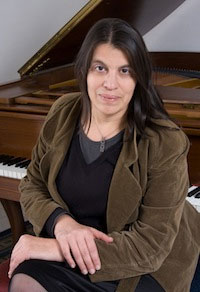The “Music of Europe” concert series, dedicated to the Bulgarian Presidency of the Council of Europe continues with a concert on 7 May, presenting works by five Dutch composers.
The selection is by pianist Angela Tosheva who calls the programme an extravaganza of sound. A musician with interests in many spheres, Angela has a definite propensity for the music of the 20th and 21st century. Laureate of numerous international competitions during her studies at the Lyubomir Pipkov National Music School and the Pancho Vladigerov Music Academy, a pedagogue, author of a scientific study in the sphere of chamber music, in 2003 she ultimately opted to be a free artist. Together with pianist and composer Michail Goleminov, the two founded the Orange Factory music agency. The company released a CD of piano works by Bela Bartok, as well as an album of her performances of works by Scriabin, Debussy and Ligeti. In 2007 Angela Tosheva recorded a CD of music by composers from the Netherlands, sponsored by the Dutch Ministry of Culture.
 “It is probably this album, which got excellent reviews, that was the reason why I was invited by the organizers of the upcoming concert,” says Angela Tosheva.
“It is probably this album, which got excellent reviews, that was the reason why I was invited by the organizers of the upcoming concert,” says Angela Tosheva.
“The music of the Netherlands” is presented on the basis of a criterion that makes it truly unique – the “sleeping beauty” criterion. In the 17th century, the music of the Netherlands served as an inspiration to foremost European composers Handel and Bach. And this is no coincidence. We know Orlande de Lassus, Guillaume DuFay, Jan Pieterszoon Sweelinck and the other grandmasters of polyphony as the people who created the Netherlandish polyphonic school. Their music generates massive creative energy which had, for one reason or another remained “closed up”, to be “unleashed” three and a half centuries later. I’d say that at this time, the Netherlands can be said to be the world’s leader in contemporary music. I see in its musical culture a sweeping freedom, a desire to be independent, and what is really important –constructive ideas. To my mind, the Dutch are the foremost constructivists in the creation of music.
I have included in the programme several pieces by Jan Pieterszoon Sweelinck which demonstrate the idioms of the music language of the age. It goes without saying that this is a language that is difficult to transpose for the piano because it is music written specifically for the organ. The programme begins and ends with works by Sweelinck, in the middle we have a Pavana Philippi, whose story is fascinating. It was composed by British composer Peter Philips, who was in jail at the time, unjustly accused of plotting against the queen. Philips wrote the theme while he was in prison. It is a veritable gem, it is difficult to believe even that it was possible to create such “modern jewel” so long ago.
In my search for music that would really touch my heart, I came across at least a hundred works by 20th century Dutch composers, so making a selection was no easy thing. Perhaps the most prominent post World War I composer from the Netherlands is Willem Pijper. I play his Sonatina no. 3. It is followed by a groundbreaking work from the 1970s - Sonata by Tristan Keuris – a foremost avant-garde composer, whose life spanned just 50 years, a colossal talent of the Netherlandish music school, cut short so early. It is a work that is very reminiscent of Lazar Nikolov’s Sonata No. 6 which I am very familiar with. I asked myself whether this was a language that was “in the air of the 20th century”. There are so many things the two works have in common. When people capture energy of this kind, the borderlines seem to vanish. I also perform For Her by Geert van Keulen – renowned clarinet player, though not very well known as a composer. Really beautiful music, though somewhat “raw” and better suited to the clarinet than to the piano, a short, intense piece. I have also included Image de Moreau, created by Louis Andriessen, arguably the Netherlands’ most famous composer around the world. This toccata creates a “vibrant” mood, imbuing the programme as a whole with a classical style. The concert has no intermission so it is delivered as an extravaganza of sound.”
English version: Milena Daynova
The conductor with Bulgarian roots, Italian upbringing and a German passport, Boian Videnoff – a talented and charming musician and manager with an enviable European career, was in Sofia in mid-March for two performances of "Madame..
95 years ago, on 2 April 1930, Bulgarian folk singer Stefka Sabotinova was born in the village of Rozov Kladenets in the Stara Zagora region, in the home of settlers from Aegean Thrace. It was from her grandmother, Dobra, a remarkable singer herself,..
Singer Ivelina Kolaksazova – IVE and the increasingly popular author, producer and performer Lyubomir Boyanov - Chaz have presented their new song "Byagam". It is a continuation of the story hinted at in their previous joint single ''Sinyoto v Ochite..

+359 2 9336 661
